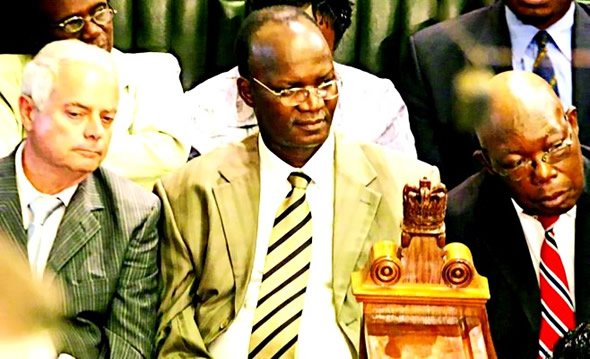By Gugulethu Nyazema recently in Tsholotsho
HARARE – He is an “energy god” when it comes to pushing propaganda for President Robert Mugabe and military generals and he hopes one day he will take power. But, in his Tsholotsho constituency, villagers can barely read, hence the verbose sentences serial political flip-flopper Jonathan Moyo churns out weekly mean nothing to them.

The man they voted for as an independent candidate in 2008 after he convinced them he had ditched Zanu PF has flip-flopped true to character. Harare is now Moyo’s home plus the little matter of attending to a farm in Mazowe, grabbed from a white farmer and handed to him by President Robert Mugabe as reward.
Poor Tsholotsho — about 600km away — comes as an afterthought.
A visit to this dry area reveals a sorry tale of neglect.
“There is hardly any water in this place and women have to walk long distances to fetch water. And because this place is so dry we cannot grow any food to eat. Children are not going to school because we can’t take them to school. It is a great achievement if we manage to have a child finishing Grade Seven,” said one of the locals.
He is not exaggerating.
Villagers here relieve themselves in open spaces and they share river water with animals for drinking. Moyo became MP for this area by defeating a candidate fielded by Mugabe’s Zanu PF party. Moyo had just fallen out with Mugabe, to the extent of suggesting: “That Mugabe must go now, is thus no longer admissible opposition slogan, but a strategic necessity.”
He went further to tell United States diplomats that Mugabe was ill and plotted to have him removed.Today, he is back “manufacturing” propaganda for Mugabe.In the process, he appears to have abandoned his constituency, which voted him in as an independent, to expend his energies on defending Mugabe’s crumbling political empire.
The sight of little children running naked on a school day because parents cannot afford clothes and school fees gives a glimpse of the poverty residing here — it is dire. Water is a rarity and so are toilets. “We use the open spaces when nature calls,” says a villager.
“What can we do? We do not have money for food, let alone for material to construct a toilet,” another villager says. Donkeys are the common mode of transport, and they are part of the animals they share river water with. And even the river water is not free-flowing.
Because rivers are semi-dry, villagers have to come up with techniques to tap this precious liquid. Villagers, including young children, dig a hole in the riverbed. They then place a drum which has holes around it to harvest muddy and smelly underground water.
It is such a medieval life that leaves villagers and their local leaders angry at representatives such as Moyo. Moyo is an orator who falls short on action, they say. Philip Mpala, the head of Siyaphambili Village says people in his area live like animals yet their MP is one of the most “famous celebrity” politicians in Zimbabwe.
People relieving themselves in the open, he says, has been the norm since the 1960s and Moyo has done little to alleviate matters.
“I have been here since 1963 and we haven’t had water since or used a decent toilet. Moyo is a smooth operator and is very good at feeding us lies. We can be angry now and then he will come and sweet-talk us to think that he will fix things,” the 72-year-old village head told reporters visiting the area.
There appears to be hope though — albeit from outsiders. Foreigners from the West so despised by Moyo have come to the rescue of the Tsholotsho forgotten lot.
The United Kingdom as well as United Nations agency Unicef, again largely funded by Western countries, is undertaking a $50 million project under rural water, sanitation and hygiene programme to rehabilitate boreholes in the area.
District administrator Nosizi Dube said the rehabilitation of boreholes in Tsholotsho was long overdue but more needed to be done because water problems were affecting both humans and livestock.
“Programmes should include the construction of dams because as we speak, the landfill is unlined and water has become contaminated and not only are the people suffering but livestock as well,” said Dube. Daily News





